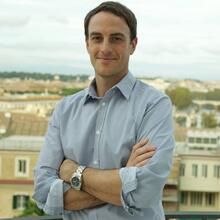A Reflection for Wednesday of the Twenty-second Week in Ordinary Time
After Jesus left the synagogue, he entered the house of Simon. (Lk 4:38)
Over the past year I’ve been looking at a lot of data on U.S. Catholics: how old they are, their race and ethnicity, what percentage of them live in rural or urban areas, how they identify politically, etc. The research is part of a new documentary project from the video team at America that captures the challenges and priorities of Catholic parish life across the U.S. today. (It will be released this fall, so stay tuned!)
One of the most compelling findings for me has been the influence of regular Mass attendance on Catholic opinion. For example, two thirds of Catholics who attend Mass weekly or more believe that abortion should be illegal in all or most cases. But for Catholics who attend Mass less often, two-thirds believe abortion should be legal in all or most cases.
Because the church holds a very strong position against abortion, data points like this can influence how we understand (and judge!) our faith and that of our fellow Catholics. We can easily oversimplify complex issues and opinions and consciously or unconsciously draw the conclusion that “good” or “worthy” Catholics attend Mass weekly or more and “bad” or “unworthy” Catholics attend less.
A question for each of us to consider is: How do I perceive Mass attendance in my own life and in the life of the church today?
In today’s Gospel, Jesus heals all kinds of ailments, from a severe fever inflicting Simon’s mother-in-law to casting out demons. But it’s important to note that his healing ministry begins once he leaves the synagogue, not while he’s in it. The opening line of the passage is a crucial one: “After Jesus left the synagogue…”
The story of Jesus, and of John the Baptist before him, begins by going out of the synagogues and the Temple rather than going in. John spent his ministry in the wilderness; Jesus spent it mostly on the road and at the dinner table.
A question for each of us to consider is: How do I perceive Mass attendance in my own life and in the life of the church today? Weekly Masses at our local parish church might feel a lot like going to synagogue in Judea in the first century. But Catholic Mass, in essence, is much more like the dinners Jesus shared with sick and marginalized people on the road during his ministry. That’s why Pope Francis insists that “The Eucharist, although it is the fullness of sacramental life, is not a prize for the perfect but a powerful medicine and nourishment for the weak.”
With this frame of mind and heart, regular Mass attendance is a beautiful, transcendent reality. It’s Simon’s house; it’s the road; it’s the deserted place where crowds are searching for Jesus. It’s also our parish church. I don’t know what percentage of U.S. Catholics view Mass attendance in this way, but I’m certain that 100% are, like me, in need of Jesus’ healing.








